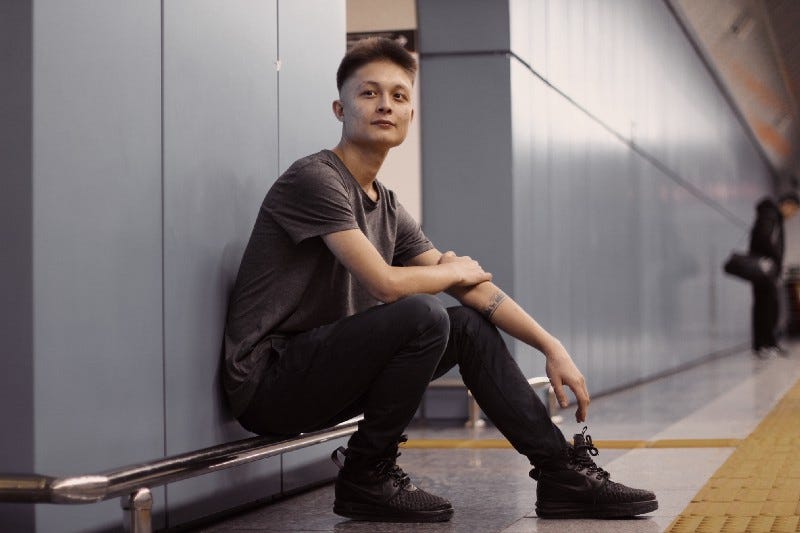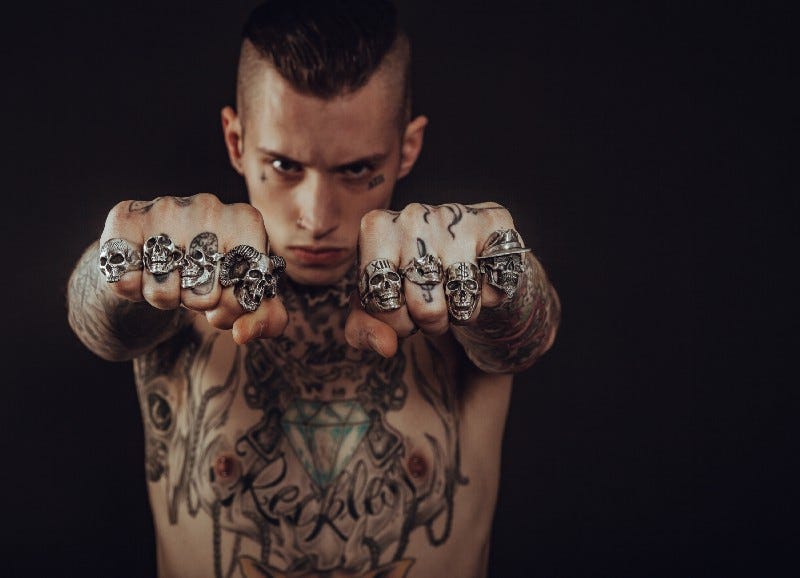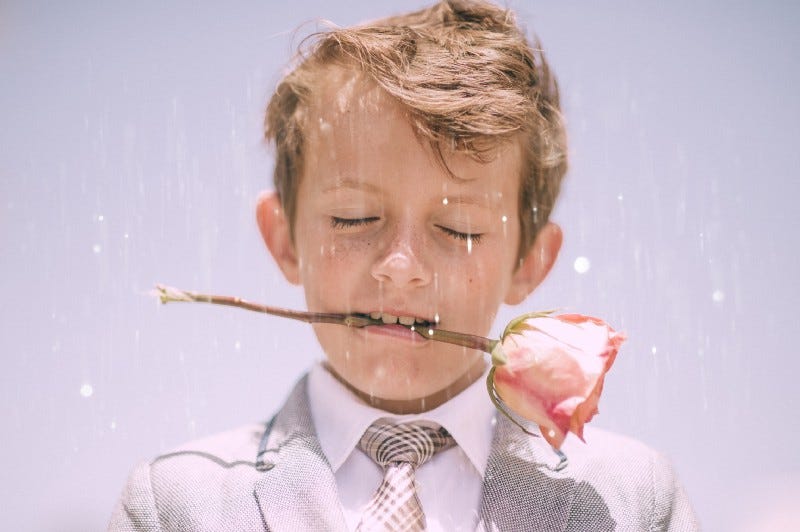A nonbinary person’s experience of privilege and social ambiguity.

“Gender Socialization” is one of the most hotly-contested, oft-misunderstood concepts that touches trans life. And considering how often cis people misunderstand us and fight about us, that’s saying a lot.
A lot of cis people struggle to understand how a trans person could ever truly and fully be the gender that they identify as. These cis people will point, with varying degrees of sincerity, to the huge swathe of gendered experiences a trans person experiences in childhood. That was when each of us was “gender socialized”, the logic goes — and thus, that was the time when a lot of behaviors and norms for us got really deeply ingrained.
In a lot of people’s minds, it seems that gender socialization is a very categorical thing: either you were forced to wear dresses, perform emotional labor, do chores, and wear makeup, or you were forced to be tough, taught to take up a ton of space, and never permitted to cry, until you turned into a totally boorish monster.
That kind of thinking justifies a lot of transphobia, particular transmisogyny. If you truly believe that anyone “raised as” a boy has an inflated sense of privilege and entitlement, you can justify excluding some of society’s most vulnerable members (trans women) from your feminist clubs and women’s restrooms. Conversely, if you think that “female socialization” makes everyone who goes through it docile, cooperative, and sensitive, then you can just ignore a trans man when he says he’s a guy, and treat him as some kind of strange version of a woman who still belongs in the girls’ club.
This line of thinking is absolute bunk. In a previous essay, I discussed the many reasons why gendered socialization is infinitely more complex than the “raised female”/ “raised male” dichotomy that so many cis folks seem to believe in. I won’t belabor the theory and sociology too much here.
Instead, in this piece, I’d like to tackle the myth of gender socialization from an entirely personal angle. I want to tell you all about the male norms I absorbed despite supposedly being “female socialized”, share with you the male privilege I have (partially) enjoyed in many areas of my life, and explore the toxic masculinity I have absorbed that I still have to work to keep at bay.
I might have lived “as a woman” for upwards of 28 years, but trust me, I was not fully female-socialized. Though I didn’t experience full “male” treatment when the world saw me as a woman, I still applied a ton of masculine standards and expectations to myself, and learned a lot of nasty, masculine-coded messages about toughness and emotional unavailability. And in many cases, I got a lot better treatment than actual women did.
Male Norms

I used to manspread on the train while wearing short dresses. It felt right to ease back and open my legs, to enjoy the comfort and flexibility that a skirt affords, but which is often squandered due to social expectations that say you’re supposed to cross your legs. I would drape my arms on the backs of chairs too, and throw my leg up on a desk without a second thought.
A colleague told me recently that during the interview for the job that I now have, I put my knee up on the table of the meeting room. That had struck him as a bit arrogant, and a bit odd, but thankfully he hadn’t held that against me. It does sound like me. I don’t mean to be rude, or entitled, I just think my body deserves to be comfortable. Doesn’t everyone? Is it only men who feel that way?
I’ve always felt very entitled to my personal space, even when the world saw me as very feminine and small. So it’s always been jarring to me when someone expects me to be daintier than I am, and yield the floor to them. It doesn’t compute. I‘ve always pushed back on that faulty assumption, sometimes even throttling my body directly into men that wouldn’t get out of my way on the street. It never mattered to me whether other folks expected a “girl” to behave like that. I wasn’t behaving like a girl. I was being me.
I was always policed as a child and a teen for carrying my body this way, but it never seemed to stick. I got shamed for not being ladylike, I was unfairly perceived as rude or strange for carrying myself in a male-ish way, but inside me I always carried the conviction that these standards were wrong. Not only were they unbearably sexist, they also were not applicable to me.
I’ve also always carried within me a male-ish sense of strength and independence, even though my body is small, weak, and uncoordinated. I’ve never felt frightened walking home alone at night, even when I had freshly moved to Chicago and had the appearance of a 22-year-old, 5'6'’ girl. I’ve physically beaten men when they’ve tried to catcall, grope, or harass me on the street. I fantasize about getting into brawls and fights even though I don’t have the body for it. I’ve thrown myself into instances of public harassment, trying to save women from men way larger and more imposing than me. I’ll happily and assertively say “no” the second a stranger pushes up against my boundaries, without any fear of recompense.
In my mind, I have always had the security and confidence of a stereotypically privileged dude, though I’ve actually been on the receiving end of a good deal of sexism and assault. Most women in my life cannot seem to fathom it.
Recently I talked about this with a young woman who lives in the same building as me. We were both waiting for the same bus, and she was afraid to push her way into the crowded terminal, to get some much-needed shelter from the pouring rain. To me, the bus terminal didn’t look full or frightening at all. There were just a couple of people (men and women) standing there. So I just walked right in. And people parted for me and gave me space.
The young woman couldn’t understand how I felt comfortable doing that. To her, the bus station was full of imposing, boorish people who’d never notice her, never give her the space she needed and deserved. But for me, pushing my way through a throng and getting what I need is very much second nature. Long before I started presenting masculinely, I started behaving with masculine entitlement. And I’ve largely received male privilege in response.
Male(ish) Privilege
I’ve been mansplained to maybe like five times in my life. I’ve been called a bitch like, twice maybe. I don’t, as a rule, get passed over for work that is challenging and rewarding. People generally trust that I have a high level of expertise.
Ever since I was a kid, people mostly avoided condescending to me. I can’t exactly explain it; I’m sure there are layers and layers of social norms and nonverbal behaviors underlying it that my beautiful Autistic brain can’t seem to consistently grok. But for whatever reason, I have always had the male-privilege superpower of stopping mansplainers in their tracks.
I know that I speak in a confident, mature way, and that I always have. I know that people get quiet when I start to share my opinion or project that I’m well-informed on something. And having a PhD absolutely grants me a ton of privilege in this regard. But it’s not the PhD that’s doing all the work here, because I was always treated with respect. And many women I know, who also have PhD’s, don’t get the kind of treatment that I do.
I know an Art History professor who taught at the same school I did, back when I still presented femininely. She started griping to me about how outlandishly rude her students were. Though she was a highly educated, knowledgeable professional in the field, male students would doubt her expertise left and right, and try relentlessly to wear her confidence down.
“I’ll show them a painting, and their hands will shoot up,” she said to me, shaking her head with dismay. “Some guy in the class will hit me with dozens of questions, like they’re trying to test me. Where is the painting located now? What time of year was it painted? What kinds of paints were used? How much did it originally sell for? And I have to get them all right, or they’ll tear me to shreds.”
I know a lot of female psychology faculty who have experienced similar things. Boys in their classes will doubt everything they say, cut them off, attempt to flirt with them or shoot them down. These women with PhD’s have to strategize endlessly about how they’ll deflect the sexism, or redirect it; they’ll ask themselves whether they should highlight it instead, and make a teachable moment of it. They have endless conversations about the use of “Dr.” as an honorific in the classroom, and how to set the proper tone of authority. They’re trying valliantly to win a game that can’t be won, because the only positive outcome is not being expected to play. They’re absolutely trapped in other people’s biases, and there is no good solution for that.
It’s not like I’ve never had a rude or entitled student before. But when I confront them about it, they’ll clam up. I’ll tell a student that a fact he’s citing is wrong, or ask him to stop talking during my lecture, and he’ll stop. I share a fact and people assume that it’s true. If I make a mistake, my classes let it float by. And I make mistakes all the time — typos on exams or lecture slides, citations on the wrong page, word slips, all the things that humans typically and frequently get wrong. Yet nobody cares. Usually they won’t even call me out on it.
This privilege has been with me since long before I started looking more ‘male’, and it has provided me with a buoy of confidence that’s carried me through my whole life. I’m never afraid to share my writing and my opinions online, because people have nearly always respected what I have to say. I’m not afraid to apply to jobs that I want, because I often do think I could do them pretty well.
When I got the chance to sell a book to publishers earlier this year, I chatted amiably with the editors for hours, and secured multiple offers. While it was a terrifying experience, and I definitely needed a bubbled bath and a glass of wine to recover from it, some core, very masculine-coded part of me felt like I deserved to be recognized for my work, and that the book deal was a much-anticipated result of my having worked so hard.
Unfortunately, my male or male-adjacent social experiences are not uniformly positive and good. I’ve absorbed a ton of toxic masculinity as well.
Toxic Masculinity

I can be a real bastard. And back when I looked feminine and was in denial about being trans, I was actually even more of an aggressive dick. That’s because I had absorbed decades’ worth of toxic masculine norms about strength and emotional impermeability, but I didn’t yet have the self-awareness to know how to deal with it.
My expectation of adequate personal space has sometimes morphed into the desire to push people out of my way, and to refuse to grant appropriate space to others. My desire to be tough has often left me wanting to harm others, usually with my words rather than my fists. I’ve always wanted to be monstrous, a supervillain, a Super Saiyan Vegeta making his enemies bleed. But since I’ve always been small, kind of effeminate, and weak, I’ve had to use an acid tongue to make people feel small.
It’s so childish and defensive, to fantasize about violence like this — and it’s even worse to let these fantasies leak into my actual life. But that’s the impact that society’s images of masculinity had on me. And for many years, it determined how I lived. If I couldn’t look like the androgynous, male-ish person that I felt that I was, I would have to project masculine traits instead.
I was sarcastic, brittle, and emotionally shut down. I was obsessed with being tough and impervious. I took a lot of pride in how much pain I could endure, how long I could go without eating, how far I could walk without a break, even how few hours of sleep I could function on. I felt competitive about things like my intelligence and my academic performance. I tried to get more things done, and more quickly, than anyone else, and to rack up as many achievements as I could. I was never going to be athletic, but I could beat people in my own little ways. It was subtle on the outside, but internally a fire blazed inside me.
I was ashamed to cry in front of people. I still have a really hard time with this. And that sucks, because I’m actually a pretty tender soul, and I want to cry a lot. But I’d decided, early on in my life, that I wanted to seem like an unfeeling, unflinching robot. I thought thinks like self-care, therapy, and pampering were frivolous and embarrassing, and that having childlike or gentle qualities ought to be a shame. And so I denied myself so many wonderful experiences and opportunities for growth, and drove a lot of people away.
That is not what girls are taught to be. This is not your typical consequence of so-called “female socialization”. A lot of girls might get brow-beaten into hiding their anger and making their sadness beautiful and quiet, sure, but they aren’t generally taught to act as if they’re made of stone. And nobody taught me I had to be that way either. I just saw that was what men were, and decided it was for me.
…

Paradoxically, as soon as I embraced my identity as a trans person, the stony walls I’d put up began to crumble. The more I admitted there were male sides to me, the less of a toxically masculine dick I became. I started being able to picture myself as emotionally present and kind. I no longer felt the need to be as aggressive and behaviorally “male”as I could be, because my identity and appearance was doing the heavy lifting in that department. I felt more at ease, less defensive about being not properly seen.
I also started noticing all the privilege and advantages I did have, and had always had, and got to wondering about how to properly deal with them.
Nowadays, I think a lot about what it means to live in this strange middle space that I inhabit, and how I can acknowledge both my privilege and my “socialization”, and honor how each of them have influenced my life. I was seen as a woman for 28 years, and I was harassed, assaulted, and looked down on at times. Yet I can also see that my life was never characterized by the same level of sexism that the women around me received. I actually got a lot of social advantages for acting like a dude, even when I didn’t look like one. And with that came a lot of nasty, stereotypically masculine ideas about weakness, strength, and my own superiority.
I never know what to say when a cis person offhandedly says that I was female socialized, or when a woman invites me to her “women and nonbinary” club. I don’t belong in women’s spaces, and it’s strange that people like me are given more access to them than transfeminine people are. It’s wrong for people like me to be seen as “women lite”, while assigned-male trans people are so systematically excluded and seen as something other than what they are. I won’t have any part in promoting it or perpetrating it. It erases who I am, and puts others at risk of violence.
As much as cis people like to assume that I had a woman’s life in the years before I came out, the truth is I never really did. But it wasn’t an entirely male life either. I was a piece of “assigned female” hardware, running mostly male software, for decades, and people didn’t know how to deal with that. But now that I’m out as nonbinary, and I can clearly see all these nuances and complexities, I’m just working to be as responsible, honest, and tender as I can be. I have a lot of nasty male norms to unlearn, but I also have a lot of social advantages and acceptance working for me. I hope that someday cis people will be able to see that.
Gender Socialization is Real (Complex)
No one is simply “socialized male” or “socialized female”.medium.com




